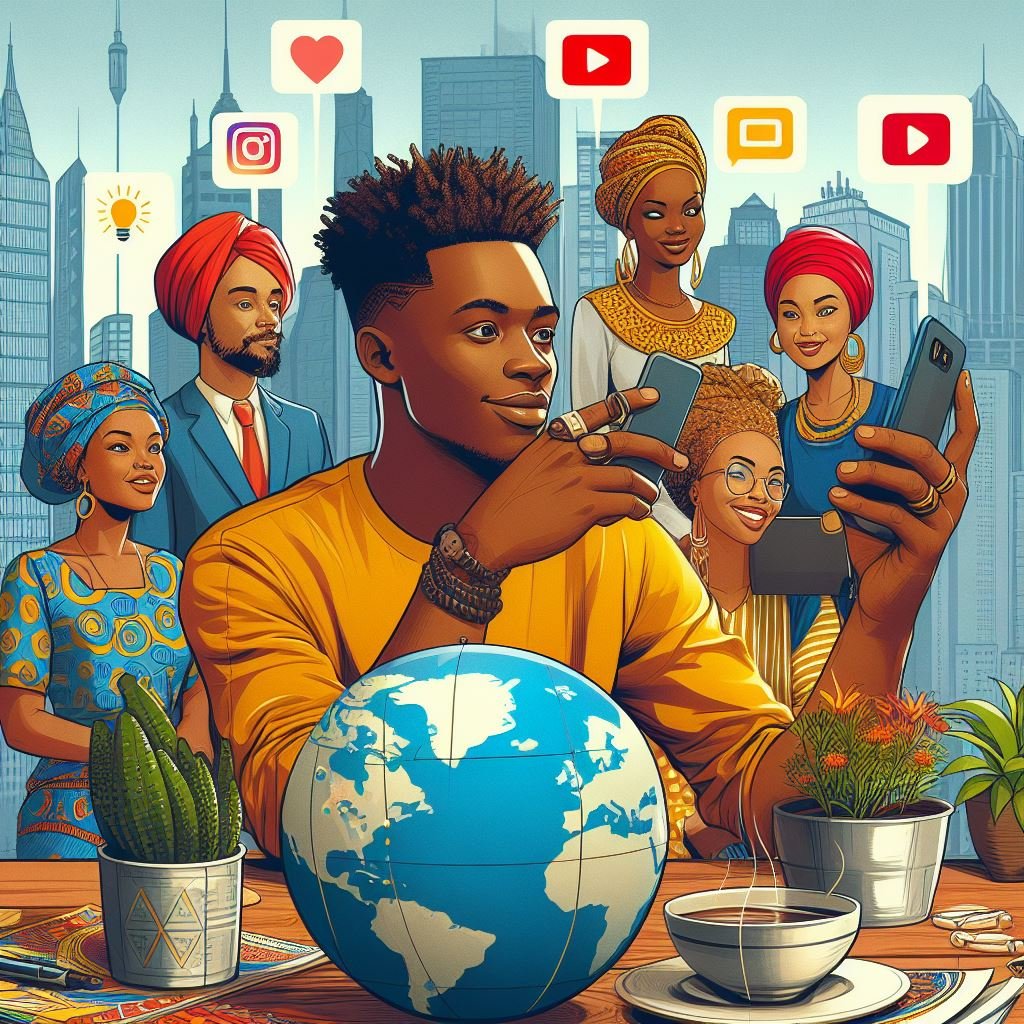
Remember the Early Days of Social Media?
Remember those early days of social media, filled with endless friend requests and questionable fashion choices documented on MySpace? Yeah, things have changed a lot since then! What started as a way to connect with friends has evolved into a powerful platform for creativity, connection, and even business growth.
Today, social media is no longer just about scrolling mindlessly. It has become an ecosystem of opportunity, where individuals can transform their passions into profitable careers. Nowhere is this more evident than in Africa, where a new wave of influencers is leveraging digital platforms to build thriving businesses.
The New Wave of African Influencers
Introducing the new generation of African influencers—online entrepreneurs sweeping social media with their viral content. These passionate creators are using their voices and unique perspectives to build massive followings, generate revenue, and even launch their own brands.
We are talking about everything from fashionistas with killer styles to tech gurus dropping knowledge bombs, to comedians leaving us in stitches. Their content is fresh, engaging, and deeply rooted in African culture, making it relatable to millions of followers.
But how exactly are these influencers turning social media into a business empire? Let’s break it down.
The Rise of the African Influencer
Gone are the days when only Hollywood celebrities graced the screens. Social media has democratized fame, bringing popularity to everyday individuals with a smartphone and a strong online presence. In Africa, this shift has given rise to influencers who are creating powerful digital brands from scratch.
These influencers have mastered platforms like YouTube, Twitter, Facebook, Instagram, and TikTok. Their content is carefully curated, strategically optimized, and designed to captivate their audience. Unlike traditional celebrities, influencers engage directly with their followers, making them more relatable and trusted.
But it’s not just about likes and shares. The loyal communities these influencers have built serve as the foundation for their business ventures. Here’s how African influencers are monetizing their platforms:
1. Affiliate Marketing
You’ve probably seen your favorite YouTuber promoting a product and asking you to use the link in their description. That’s affiliate marketing—one of the easiest ways influencers make money.
Through partnerships with brands, influencers are given special affiliate links to promote. Every time someone purchases a product through that link, the influencer earns a commission. This model is particularly effective in Africa, where e-commerce is on the rise, and consumers trust recommendations from personalities they follow.
Example: South African beauty influencer Mihlali Ndamase has leveraged affiliate marketing to promote skincare and makeup brands, generating significant revenue while helping her followers discover new products.
2. Brand Deals & Sponsorships
Why should big brands pay millions for TV ads when they can partner with influencers who have just as much reach? From fashion giants to tech companies, brands are actively collaborating with African influencers for targeted marketing campaigns.
Brand deals can include:
- Sponsored posts
- Product placements
- Long-term ambassador partnerships
Companies are realizing that influencers provide a direct line to niche audiences, making their advertising efforts more effective and authentic.
Example: Nigerian influencer Dimma Umeh has worked with international beauty brands like MAC and Fenty Beauty, bringing global products into the African market.
3. Selling Their Own Products
At a certain point, successful influencers transition from promoting other brands to building their own. This is where true financial independence begins.
Many African influencers have launched businesses based on their niche:
- Beauty influencers create makeup or skincare lines.
- Fitness influencers sell workout programs and meal plans.
- Tech influencers launch digital courses or consulting services.
Example: Kenyan entrepreneur Elsa Majimbo went from making humorous Instagram videos to securing international brand deals, launching her own merchandise, and becoming a global influencer icon.
4. Monetizing Content Through Ad Revenue
Platforms like YouTube and TikTok offer revenue-sharing programs where influencers earn money based on views and engagement. The more viral the content, the higher the earnings.
While ad revenue alone isn’t enough to sustain a career, it serves as a strong foundation for content creators looking to build multiple income streams.
Example: Ghanaian YouTuber Wode Maya turned his passion for travel into a full-time business, making thousands of dollars monthly from YouTube ads while showcasing Africa’s beauty.
5. Digital Courses & Coaching
Another trend emerging among African influencers is the sale of digital products. Many are packaging their expertise into online courses, e-books, and mentorship programs, offering aspiring influencers and entrepreneurs a roadmap to success.
Example: Business coach Vusi Thembekwayo has successfully used social media to sell high-ticket coaching programs, teaching African entrepreneurs how to scale their businesses.
The Challenges African Influencers Face
While the growth of influencer marketing in Africa is promising, it’s not without its challenges:
- Limited brand trust: Many local companies still prefer traditional advertising over influencer marketing.
- Unstable internet access: Reliable internet is crucial for content creators, but some regions still face connectivity issues.
- Monetization barriers: Some global monetization programs, like YouTube’s Partner Program, have restrictions for African creators.
Despite these obstacles, African influencers continue to innovate and push boundaries.
What Does the Future Hold for African Influencers?
The future of influencer marketing in Africa is bright. With social media becoming more integrated into daily life—professionally, educationally, and socially—African influencers are poised for even greater success.
As the business world starts recognizing the power of digital influence, traditional companies will eventually embrace influencers as key marketing partners. More African entrepreneurs will also tap into the digital space, creating new opportunities for monetization.
Additionally, advancements in fintech and blockchain technology may enable easier, faster payments for African influencers working with international brands.
Final Thoughts
African influencers are no longer just entertainers—they are business leaders, brand builders, and digital entrepreneurs. By leveraging the power of social media, they have successfully transformed their passions into profitable careers, proving that influence is more than just numbers—it’s about impact.
As more brands, both local and international, recognize the value of influencer marketing, we can expect even greater opportunities for African content creators. This is just the beginning of Africa’s digital revolution.
So, if you’re an aspiring influencer or entrepreneur, now is the time to build your brand. The digital space is waiting for you!







